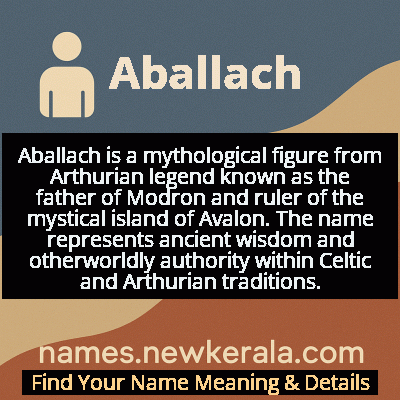Aballach Name Meaning & Details
Origin, Popularity, Numerology Analysis & Name Meaning of Aballach
Discover the origin, meaning, and cultural significance of the name ABALLACH. Delve into its historical roots and explore the lasting impact it has had on communities and traditions.
Name
Aballach
Gender
Male
Origin
Arthurian
Lucky Number
4
Meaning of the Name - Aballach
Aballach is a mythological figure from Arthurian legend known as the father of Modron and ruler of the mystical island of Avalon. The name represents ancient wisdom and otherworldly authority within Celtic and Arthurian traditions.
Aballach - Complete Numerology Analysis
Your Numerology Number
Based on Pythagorean Numerology System
Ruling Planet
Uranus (Rahu)
Positive Nature
Strong sense of order, loyal, practical, and disciplined.
Negative Traits
Stubborn, overly serious, rigid, and prone to feeling restricted.
Lucky Colours
Blue, gray.
Lucky Days
Saturday.
Lucky Stones
Blue sapphire.
Harmony Numbers
1, 7, 8.
Best Suited Professions
Managers, engineers, accountants, organizers.
What People Like About You
Dependability, discipline, practicality.
Famous People Named Aballach
Aballach of Avalon
Mythological Ruler
Legendary ruler of the mystical island of Avalon and father of the goddess Modron
Aballach ap Llew
Celtic Chieftain
Historical figure mentioned in Welsh genealogies as an ancestor of royal lines
Aballach the Wise
Druidic Scholar
Mythical figure credited with preserving ancient Celtic wisdom traditions
Name Variations & International Equivalents
Click on blue names to explore their detailed meanings. Gray names with will be available soon.
Cultural & Historical Significance
His association with Avalon, the mystical island of healing and transformation, places him at the heart of one of the most enduring Arthurian motifs. As the father of Modron (who becomes Morgan le Fay in some traditions), Aballach connects to the important mother goddess figure in Celtic religion, representing the continuity of divine lineage and the transmission of magical knowledge. This positioning makes him a key figure in understanding how Celtic divine families were reinterpreted in Arthurian context, maintaining their mystical attributes while being integrated into Christian-era narratives about kingship, magic, and the otherworld.
Extended Personality Analysis
Aballach is characterized by a profound combination of mystical detachment and paternal authority. His personality reflects the wisdom of someone who has witnessed countless cycles of time and understands the deeper patterns of existence. He typically displays calm judgment, never reacting impulsively but considering matters with the perspective of eternity. This makes him an excellent counselor and guardian, though it can also create distance from those bound by mortal concerns and timeframes. His rulership of Avalon suggests a personality comfortable with ambiguity and mystery, able to navigate between worlds and understand multiple layers of reality simultaneously.
As a father figure, Aballach demonstrates protective instincts tempered by an understanding of destiny and the necessity of allowing his children to fulfill their own paths. His relationship with Modron shows both deep affection and recognition of her independent power and purpose. This balance between guidance and release characterizes his approach to leadership and family alike. He embodies the ideal of the wise elder who possesses great power but exercises it with restraint, understanding that true wisdom lies in knowing when to act and when to allow natural cycles to unfold according to their own timing and purpose.
Modern Usage & Popularity
In contemporary times, the name Aballach remains exceptionally rare and is primarily confined to specialized contexts rather than general usage. It appears most frequently in academic discussions of Celtic mythology, Arthurian studies, and comparative mythology. Within creative communities, the name finds occasional use in fantasy literature, role-playing games, and Arthurian-inspired media as a character name denoting ancient wisdom, mystical authority, or otherworldly heritage. Its usage as a given name for children is virtually nonexistent in mainstream culture, though it might be chosen by parents with deep interests in Celtic heritage or Arthurian legend seeking a distinctive mythological name. The name's strong association with specific mythological narratives and its unfamiliar sound to modern ears limit its broader appeal, keeping it within the realm of scholarly and creative specialization rather than popular naming trends.
Symbolic & Spiritual Meanings
Aballach symbolizes the guardian of threshold spaces and the keeper of ancestral wisdom that bridges different realms of existence. As ruler of Avalon, he represents the mystical authority that presides over places of transformation and healing, embodying the concept of sacred stewardship. His position as father of Modron connects him symbolically to the continuity of divine lineage and the transmission of magical knowledge through generations. The name evokes the misty boundaries between worlds, suggesting someone who understands both mortal concerns and otherworldly perspectives. He symbolizes the wisdom that comes from understanding cycles beyond human lifespans and the responsibility that accompanies ancient power. His character represents the enduring presence of Celtic mythological consciousness within the Arthurian tradition, serving as a living connection to pre-Christian spiritual understandings of the world.

